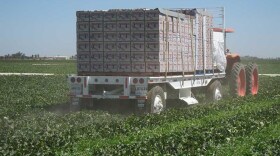As the brewing trade war between the United States and China escalates, North State farmers are caught in the middle. Farmers like Bill Carriere, the CEO of Carriere Family Farms and a board member of the California Walnut Commission.
Carriere greeted me outside of his office and walnut processing facility near the small town of Glenn. In the parking lot, we watched as one of his employees loaded crates of walnuts into a semi-truck. Carriere said the truck will be driving these crates to the Port of Oakland. His company ships their walnuts to 25 different countries, including China.
Carriere Family Farms grows twelve different varieties of walnuts. They have orchards in Glenn, Butte and Colusa counties. They also buy walnuts from just under 100 other farms, all north of Sacramento and package the walnuts for global export at their processing facility.
But recently, the Chinese government increased the tariff on a number of fruit and nut crops, including walnuts and almonds, by 15 percent. This was in response to the Trump administration’s announcement that the U.S. is increasing their tariffs on a number of imports from China. It's still unclear how exactly this will impact North State growers, but Carriere believes the tariffs will definitely be felt by everyone in the business.
“When it gets passed down to the farmer, what does the farmer do with his money?” he said. “Well he hires labor, he buys fertilizer, he buys tractors, he buys all the other inputs; and if he has less money to do that then that's going to affect all the ancillary, ancillary businesses in the counties.”
According to the 2016 crop reports, walnuts and almonds are the top agricultural crop across a number of North State counties, including Glenn, Colusa, Tehama, and Butte. Carriere said that walnuts in particular are a Northern California specialty crop with 99.9 percent of American walnuts being grown in California and more than half of those grown right here in the North State.
Marcie Skelton is the agricultural commissioner in Glenn County. Her agency is responsible for inspecting all of the exported products and certifying that they meet the standards of the country to which they are being shipped.
Skelton said it's impossible to say exactly how much product Glenn County alone exports to China, because farmers will often sell to a processor in another county. When that happens, that county is responsible for registering the product as an export, not Glenn. In other words, it’s possible that there is a lot more product going to China than she has recorded in her books. Skelton said that statewide about six percent of all walnut exports and about 12 percent of all almond exports are shipped to China. In Glenn County she said there are around 30,000 acres of nut bearing walnut trees and 48,000 acres of nut bearing almond trees. All of those nuts are going to need somewhere to go.
“The global markets have definitely been developed over the years and our growers have responded to meet that demand and so we have trees in the ground with hopes to export those.” Skelton said.
If the tariff hike is not negotiated, it’s exporters like Bill Carriere who are going to have to decide where to ship these nuts instead. Carriere, just hopes that this will all be sorted out before September, which is just before the bulk of freshly picked nuts are shipped. If not by December, then his hope is that it will be sorted out within a few years. He said that once California is outcompeted in the Chinese market, it’s nearly impossible to get back in.






